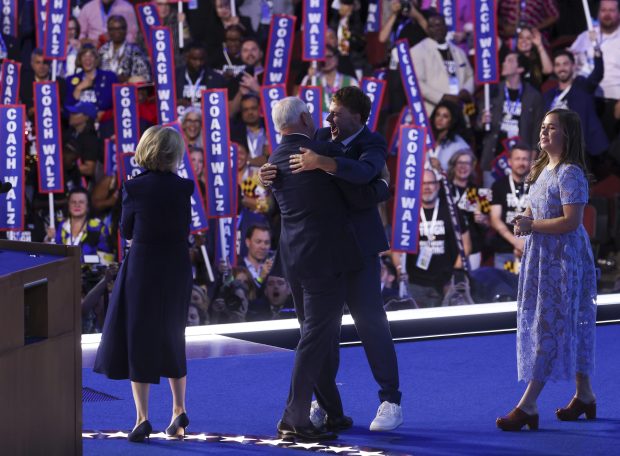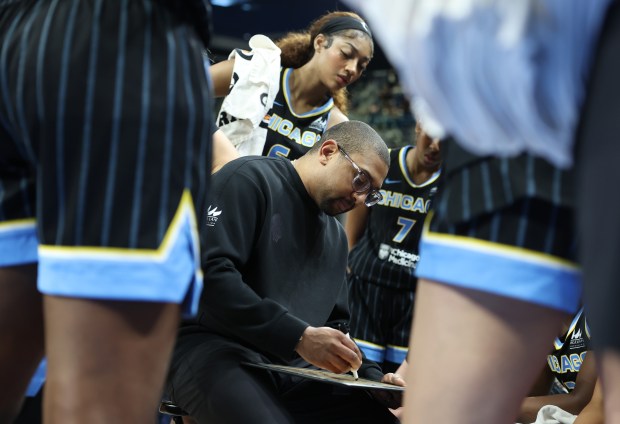Minnesota Gov. Tim Walz’s son Gus moved the audience Wednesday night in the United Center with a display of emotion as his father spoke that many saw as heartwarming.
After 17-year-old Gus was shown on national television at the DNC in Chicago tearing up, clapping and yelling out, “That’s my dad!” People magazine posted a statement from the older Walz and wife Gwen that Gus has “a non-verbal learning disorder,” along with anxiety and ADHD.
The Tribune talked to experts, who used the terms “neurodivergent” and “disability” to describe conditions like Gus Walz’s. The Walz family statement did not use those terms.
Viral clips like the one between Gus Walz and his father can make all the difference for neurodivergent people, said Kimi Matsumura, founder of the nonprofit Chicago Autism Network.
“Exposure is huge,” she said. “The world getting to see the beauty of Gus Walz and his relationship with his dad I think will open up a lot of hearts.”
What is non-verbal learning disorder?
Non-verbal learning disorder is a condition in which a person has difficulty processing information other than words or speech, according to the Cleveland Clinic. The name of the condition is not about the ability to speak.
A person with a non-verbal learning disorder might have trouble with problem-solving, spatial awareness, social cues and executive functioning including emotional regulation, according to the Cleveland Clinic.
What has Gov. Walz said about his son’s condition?
“It took time, but what became so immediately clear to us was that Gus’ condition is not a setback — it’s his secret power,” Tim and Gwen Walz reportedly said to People.
The couple said they love and are proud of their son, who they called “brilliant, hyper-aware of details that many of us pass by” and an “excellent brother.”
What reaction has there been on social media?
Social media supporters of the Walzes have hit back on a number of conservative commentators that criticized Gus Walz’s reaction.
One of them was Ann Coulter, who posted “Talk about weird…” along with an image of the younger Walz. The post has since been deleted, but “Ann Coulter” trended Thursday afternoon on the social media platform X.
The post seemed to be a spin on the Minnesota governor’s use of the word “weird” to describe Republican vice presidential nominee Sen. JD Vance and other conservatives.
“I am neurodivergent. When I was 14, I was diagnosed with ADHD, OCD, and several learning disorders, including dyscalculia,” Moms Demand Action co-founder Shannon Watts wrote, also on X. “We’re not weird, we’re wonderful. And we’re your family, friends and fellow Americans.”
What does this mean for neurodivergent people?
Many neurodivergent people are met with “hesitation and uncertainty” in daily life by people who do not understand them, Matsumura of the Chicago Autism Network said. But moments where neurodivergence is celebrated can shed more light into the many things neurodivergent people bring.
Matsumura’s daughter was diagnosed with autism at three years old. There are tough moments amid side eye and joy when milestones are hit, she said.
Having a community of neurodivergent people can “mean the world” to neurodivergent people and their parents alike, she said. She hopes the Walz’ family can help people connect with those communities.
“It’s really important that we have moments like that where we can value and see the strength and beauty of diversity in all of its forms,” she said.
Delaware State Rep. Kerri Evelyn Harris, inaugural chair of the Democratic National Committee Disability Caucus, said the moment was “starting that deeper conversation around disabilities.”
“Gus’ reaction is something that we all needed, we all enjoyed, we all could feel, and there is something that comes with being a member of the disabilities community: that when people get to know us, people get to understand that we have so much to contribute,” Harris said.




